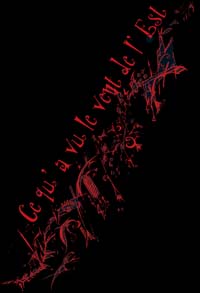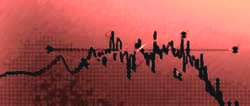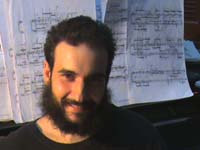
[English] - [Ελληνικά] - [Deutsch]
Ce qu'a vu le vent de l'Est*: Asian influences on contemporary piano music
(Lecture-recital)
*after C. Debussy's ...Ce qu'a vu le vent d'Ouest, the title of his seventh prelude from Book I, as a tribute to one of the first composers who paved the way for a long term collonization of the western subconscious from the East.
Program:
Τ.Takemitsu: Piano Distance
O.Messiaen : Cantéyodjayâ
J.Cage: Music of Changes 1
I.Xenakis: Mists
P.Dusapin: Etudes nr.3, nr.4
“The paradox is irresoluble: the less one culture communicates with another, the less likely they are to be corrupted, one by the other; but on the other hand, the less likely it is, in such conditions, that the respective emissaries of these cultures will be able to seize the richness and significance of their diversity.The alternative is inescapable:either I am a traveller in ancient times, and faced with a prodigious spectacle which would be almost entirely unintelligible to me and might, indeed, provoke me to mockery or disgust;or I am a traveller of my own day, hastening in search of a vanished reality.In either case I am the loser...for today, as I go groaning among the shadows, I miss inevitably the spectacle that is now taking shape.” (C. Lévi-Strauss, Tristes Tropiques)
“[...]The quote above gives a good indication of the poles we avoided during the selection of tonight concert's material: neither degradation of the Other through turning our gaze away, nor some sort of procrustean idealization in the well-known form of exoticism.Instead, we choose to focus on contemporary works which, through the influence of asian musics and philosophies, suggest new solutions to structural questions.Those are the ones around the nature and essence of sound on one hand, and the temporal perception -which in the new music jargon translates as form, continuity and discontinuity,determinacy and indeterminacy- on the other.Those structural issues are inevitably resonating with the very specifics of piano performance: texture, articulation, dynamics, pedaling and so on.In the course of this lecture, we will have the chance to explore those structural resonances through a transnational and transhistorical web of references, from the ancient I-Ching to the Indian treatise Samgitaratnakara and from the Japanese concepts of Ma and Jo-Ha-Kyũ to Middle-eastern instrumental and temporal idioms.[...]” (P. Antoniadis)
[Link to writings/complete lecture]
[Link to media]
“Αυτό που είδε ο ανατολικός άνεμος”* : Ασιατικές επιδράσεις στην πρωτοποριακή μουσική για
πιάνo
(Ρεσιτάλ-Διάλεξη)
*κατά το ...Ce qu'a vu le vent d' Ouest ( 'Oσα είδε ο Δυτικός άνεμος), τον τίτλο του 7ου πρελούδιου από τον πρώτο τόμο του C. Debussy, σαν φόρος τιμής σε έναν από τους πρώτους συνθέτες που προετοίμασαν το μακρόχρονο αποικισμό του δυτικού υποσυνείδητου από την Ανατολή.
Πρόγραμμα
Τ.Takemitsu: Piano Distance
O.Messiaen : Cantéyodjayâ
J.Cage: Music of Changes 1
I.Xenakis: Mists
P.Dusapin: Etudes nr.3, nr.4
“ Το παράδοξο είναι άλυτο: όσο λιγότερο επικοινωνούν δύο πολιτισμοί, τόσο πιο απίθανο είναι να αλλοιωθούν ο ένας από τον άλλο·όμως εξίσου απίθανο είναι οι απεσταλμένοι τους να μπορέσουν να συλλάβουν τον πλούτο και τη σημασία της διαφορετικότητάς τους.Η εναλλακτική λύση είναι αμείλικτη: είτε είμαι ταξιδιώτης σε αρχαίους καιρούς, αντιμέτωπος με θαύματα για μένα ακατανόητα, ίσως και γελοία ή αηδιαστικά·είτε είμαι ταξιδιώτης του σήμερα, σπεύδοντας πίσω από ένα κόσμο που χάνεται.Σε κάθε περίπτωση είμαι ο χαμένος...διότι σήμερα, ενώ σέρνομαι πίσω από τις σκιές, χάνω αναπόφευκτα την εικόνα που τώρα σχηματίζεται.”
“ Το παραπάνω απόσπασμα είναι ενδεικτικό των άκρων που επιδιώξαμε να αποφύγουμε επιλέγοντας το υλικό της αποψινής συναυλίας: ούτε υποβιβασμός του Άλλου μέσα από την αποστροφή του βλέμματος, ούτε προκρούστεια εξιδανίκευση με τη γνωστή μορφή του εξωτισμού.Αντ'αυτών, επιλέγουμε να εστιάσουμε σε σύγχρονα έργα τα οποία, μέσα από την επίδραση μουσικών και φιλοσοφιών της Ασίας, προτείνουν νέες λύσεις σε δομικά ερωτήματα.Αυτά αφορούν τη φύση και ουσία του ήχου από τη μια, και την αντίληψη του χρόνου-που στη γλώσσα της νέας μουσικής μεταφράζεται ως μορφή, συνέχεια και ασυνέχεια, έλεγχος και απροσδιοριστιία- από την άλλη.Τούτα τα δομικά ζητήματα αντανακλώνται αναπόφευκτα σε ζητήματα πιανιστικής εκτέλεσης: υφή, δυναμική, άρθρωση, πεντάλ κτλ.Σ'αυτή τη διάλεξη θα έχουμε την ευκαιρία να εξερευνήσουμε αυτές τις πτυχές μέσα από ένα δι-εθνικό και δι-ιστορικό δίκτυο αναφορών, από το αρχαίο I-Ching στην Ινδική πραγματεία Samgitaratnakara και από τις ιαπωνικές έννοιες του Ma και του Jo-Ha-Kyũ σε μεσανατολικά οργανικά και χρονικά ιδιώματα.”
[Link to writings/complete lecture]
[Link to media]
Ce qu'a vu le vent de l'Est* (Was der Ostwind gesehen hat): Asiatische Einflüsse in der zeitgenössischen Musik
(Solokonzert mit Vortrag)
*nach C. Debussys ...Ce qu'a vu le vent d'Ouest (Was der Westwind gesehen hat), sein siebtes Präludium vom I. Buch, als Ehrung für einen der ersten Komponisten, die den Weg für eine langfristige Kolonisation des westlichen Unterbewussten durch den Osten ebneten.
Programm:
Τ.Takemitsu: Piano Distance
O.Messiaen : Cantéyodjayâ
J.Cage: Music of Changes 1
I.Xenakis: Mists
P.Dusapin: Etudes nr.3,nr.4
"Das Paradoxοn ist unauflösbar: Je weniger eine Kultur mit einer anderen in Kommunikation tritt, desto weniger wahrscheinlich es, dass sie ihre Einzigartigkeit verlieren, indem sie sich gegenseitig beeinflussen; andererseits, je weniger zwei Kulturen kommunizieren, desto weniger wahrscheinlich ist es auch, dass die jeweiligen Sendboten dieser Kulturen imstande sein werden, den Reichtum und die Bedeutung ihrer Ungleichheit zu erkennen. Im Endeffekt bin ich Gefangene einer Alternative: mal Reisender im Altertum, mit einem erstaunlichen und fast völlig unverständlichen Spektakel konfrontiert, so unfassbar, dass es meinen Spott oder meine Verachtung provozieren könnte; mal Reisender von heute, den Überresten einer verschwundenen Realität nachzujagen. In beiden Fällen bin ich der Verlierer [...], denn während ich der Vergangenheit nachtrauere, verpasse ich unvermeidlich das tatsächliche Spektakel, das hier und heute Form nimmt." (C. Lévi-Strauss, Traurige Tropen)
" [...] Das obige Zitat zeigt deutlich die zwei Extremitäten an, die wir heute Abend in der Auswahl des Konzertinhaltes vermieden haben: weder eine Erniedrigung des Anderen durch Abwenden unseres Blickes, noch eine kompromisslose Idealisierung in der wohl bekannten Form des „Exotischen“. Stattdessen haben wir uns entschieden, uns auf zeitgenössische Werke zu konzentrieren, die, durch den Einfluss der asiatischen Musikformen und Philosophien, neue Lösungen zu Form- und Strukturfragen einbringen. Es geht einerseits um die Natur und Essenz des Tons, und anderseits um die zeitliche Wahrnehmung – diese letzte wird im neuen Musik-Jargon „Form“, „ Kontinuität und Diskontinuität“, „Bestimmtheit und Unbestimmtheit“ genannt. Diese Strukturfragen finden zwangsläufig ihren Nachhall in den Parametern der Klavieraufführung: Klangtextur, Artikulation, Dynamik, Betätigen der Pedale und so weiter. Im Laufe dieses Vortrags werden wir die Gelegenheit haben, jene Resonanzen der Struktur durch ein übernationales und übergeschichtliches Netzwerk von Referenzen, vom alten konfuzianischen „I-Ching“ oder „Buch der Wandlungen“, bis hin zur indischen Abhandlung Samgitaratnakara und von den japanischen Gestaltungsprinzipien von Ma und Jo-Ha-Kyũ, bis hin zu den instrumentalen und zeitlichen Eigentümlichkeiten der mittelöstlichen Musik, zu erforschen. [...] "(P. Antoniadis)

[top]-[intro]-[home]-[bio]-[projects]-[audio]-[video]-[early]-[post war II]- [writings]-[events]-[links]-[contact]
